You are using an out of date browser. It may not display this or other websites correctly.
You should upgrade or use an alternative browser.
You should upgrade or use an alternative browser.
Nature & Animals Crocodile attacks in Indonesia are on the rise. It’s left residents on edge
- Thread starter LeonardoBjj
- Start date
- Joined
- Oct 31, 2002
- Messages
- 10,488
- Reaction score
- 12,443
BY EDNA TARIGAN AND DITA ALANGKARA
Updated 10:01 PM BRT, March 16, 2025
BUDONG-BUDONG, Indonesia (AP) — Nearly seven months after a crocodile attack almost took her life, Munirpa walked to the estuary outside her home with her husband and her children, ready to brave a reenactment.
Munirpa, who like many Indonesians only uses one name, recounted how one early morning in August, she threw her household garbage into a creek about 50 meters (164 feet) away from her house, as she normally would.
She didn’t see what was coming next.
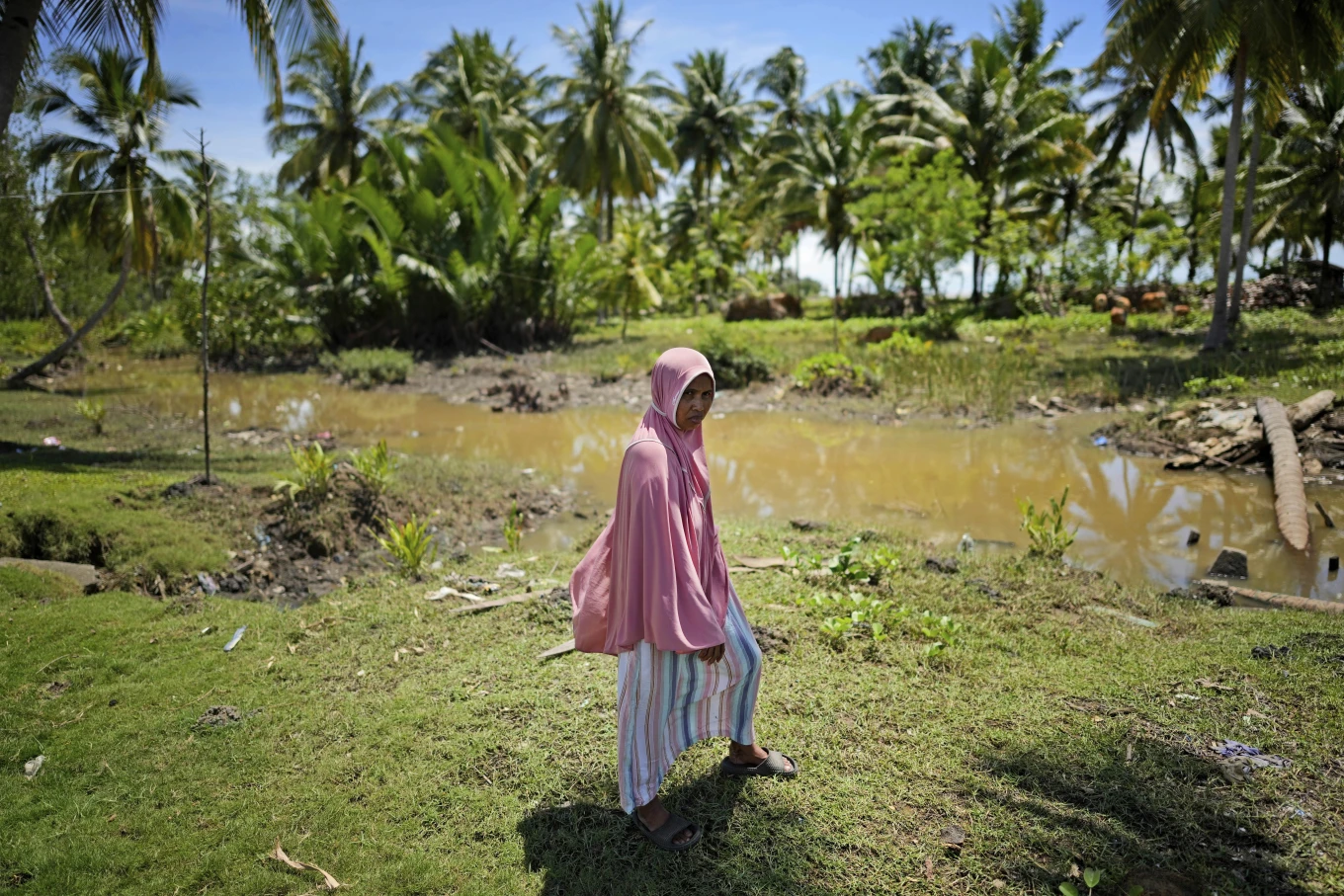
Munirpa, a crocodile attack survivor, stands for a portrait at the location where she was nearly killed by a four-meter-long crocodile, in Topoyo, West Sulawesi, Indonesia, Monday, Feb. 24, 2025.
(AP Photo/Dita Alangkara)
By the time she realized a crocodile had attacked her, the four-meter-long (13-foot) beast had already sunk its teeth into most of her body, sparing only her head. She fought hard, trying to jab its eyes. Her husband, hearing her screams, ran over and tried to pull her by the thigh out of the crocodile’s jaws. A tug-of-war ensued; the reptile whipped him with its tail. Fortunately, he saved Munirpa in time, eventually dragging her out of the crocodile’s grip.
People have long feared the ancient predators in the Central Mamuju district of Indonesia’s West Sulawesi, where the Budong-Budong River meets the sea. For Munirpa, 48, that fear turned into a brutal reality when she became one of nearly 180 recorded crocodile attack victims in Indonesia last year. Residents like her are learning to coexist with the crocodiles, a legally protected species in Indonesia, as they balance conservation with looking out for their safety. But as attacks rise, several residents and experts have called for better government interventions to stop the problem from getting even worse.
Communities near the crocodiles are on edge
Following the attack, Munirpa was hospitalized for a month and has had two surgeries. By February this year, her fear was still clearly visible, as were the scars on her legs and thighs.
“I am so scared. I don’t want to go to the beach. Even to the back of the house, I don’t dare to go,” said Munirpa. “I am traumatized. I asked my children not to go to the river, or to the backyard, or go fishing.”

In the villages surrounding the Budong-Budong River, like Munirpa’s, crocodiles have become a daily topic of conversation. Their presence has become so common that warning signs now mark the areas where they lurk, from the river mouth to the waterways which were once a popular swimming spot for children.
In 2024, there were 179 crocodile attacks in Indonesia, the highest number of crocodile attacks in the world, with 92 fatalities, according to CrocAttack, an independent database. Social media videos showing crocodile appearances and attacks in Sulawesi and other regions in Indonesia are also on the rise.
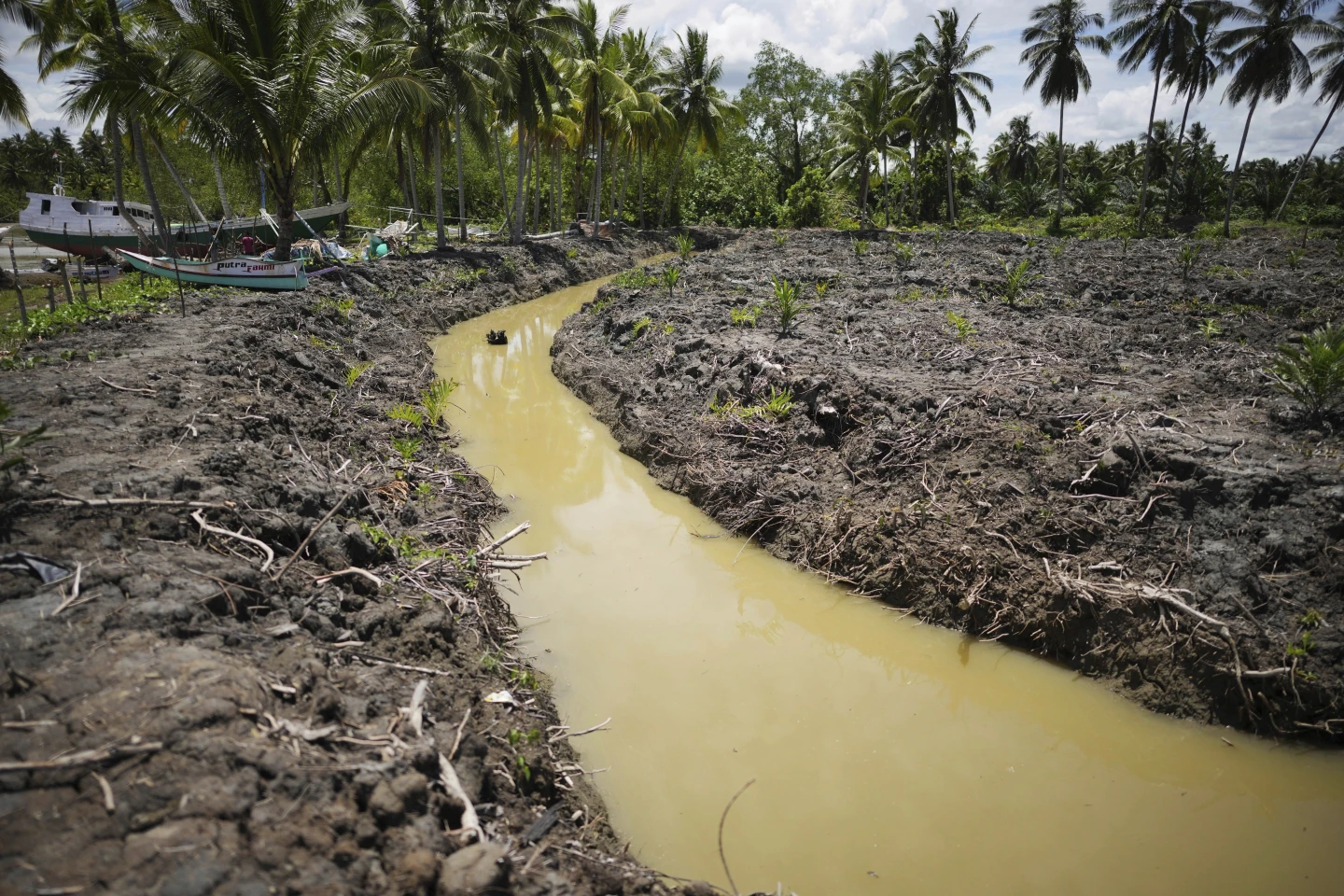
A canal dug for a newly opened palm oil plantation is visible in Budong-Budong, West Sulawesi, Indonesia, Monday, Feb. 24, 2025.
(AP Photo/Dita Alangkara)
The increase in attacks began about 12 years ago with the rise of palm oil plantations around the river mouth, said 39-year-old crocodile handler Rusli Paraili. Some companies carved artificial waterways, linking them to the larger part of the Budong-Budong River. That was when the crocodiles started straying, leaving the river and creeping to nearby residential areas, such as fish and shrimp ponds, he explained.
Palm oil plantations now dominate the landscape in West Sulawesi, from the mountains to the coast, and patrolling for crocodiles has become part of people’s daily routine. When residents check the water pumps in their ponds, they have no choice but to keep out an eye for the beasts — flashlights in hand, scouring up, down and across canals and waterways — resigned to the uneasy reality of sharing their home with a predator.
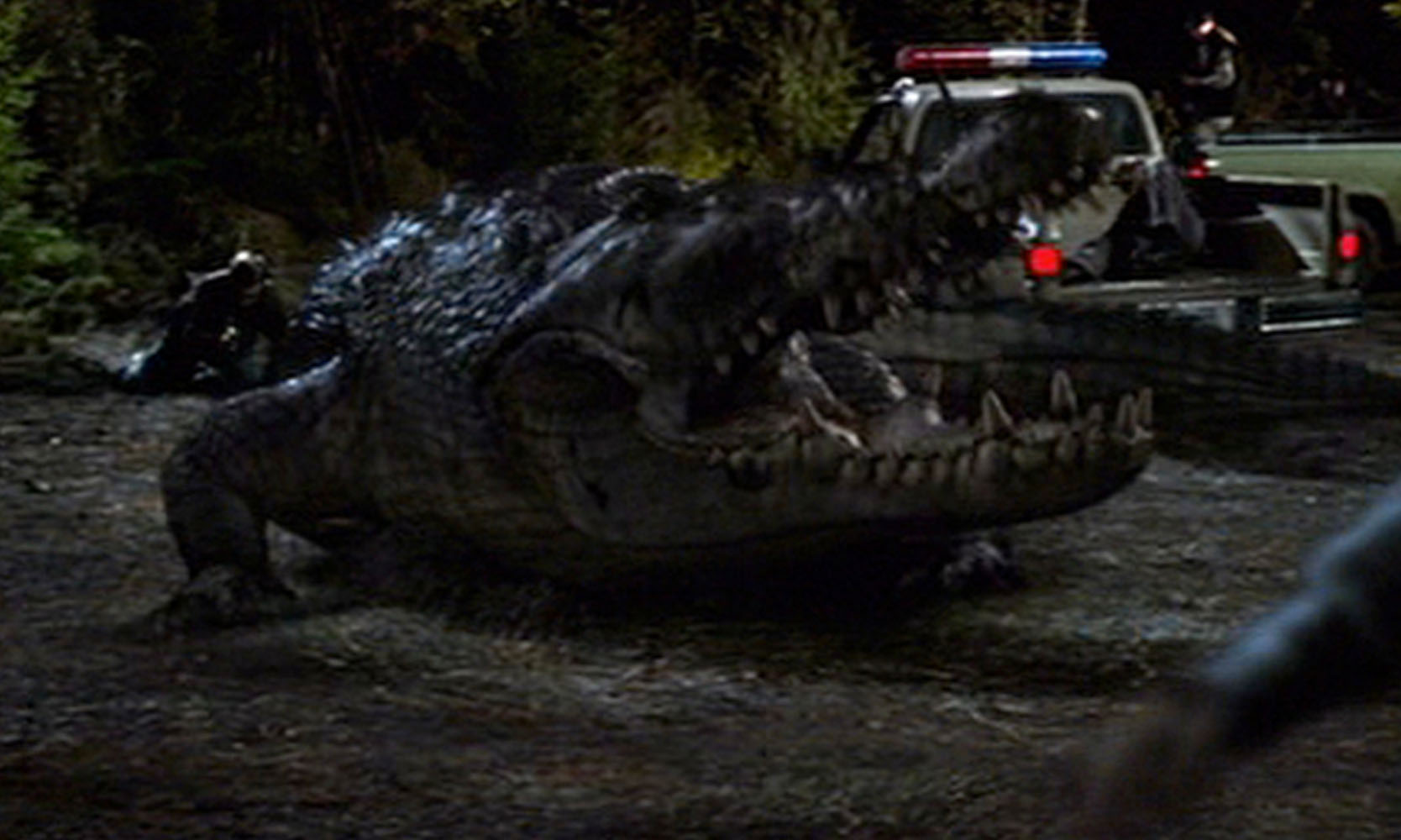
Balancing conservation and safety
The saltwater crocodile has been a legally protected species in Indonesia since 1999, making it an animal that cannot be hunted freely. As a top predator, there is also no population control in nature.
Paraili, the crocodile handler, said that while the law protects crocodiles from being killed, the rise in attacks is a major concern. In response, he’s taken care of some of the crocs in a specially-designed farm away from human populations. He’s received some financial support from the government and community donations, as well as support from palm oil companies for the last five years.
The farm has four ponds and around 50 reptiles. Some have names: Tanker, the largest, shaped like a ship, or Karossa, named after the sub-district the animal was caught after fatally attacking someone.
When funds run low, he uses his own money to ensure they’re fed, at least once every four days.
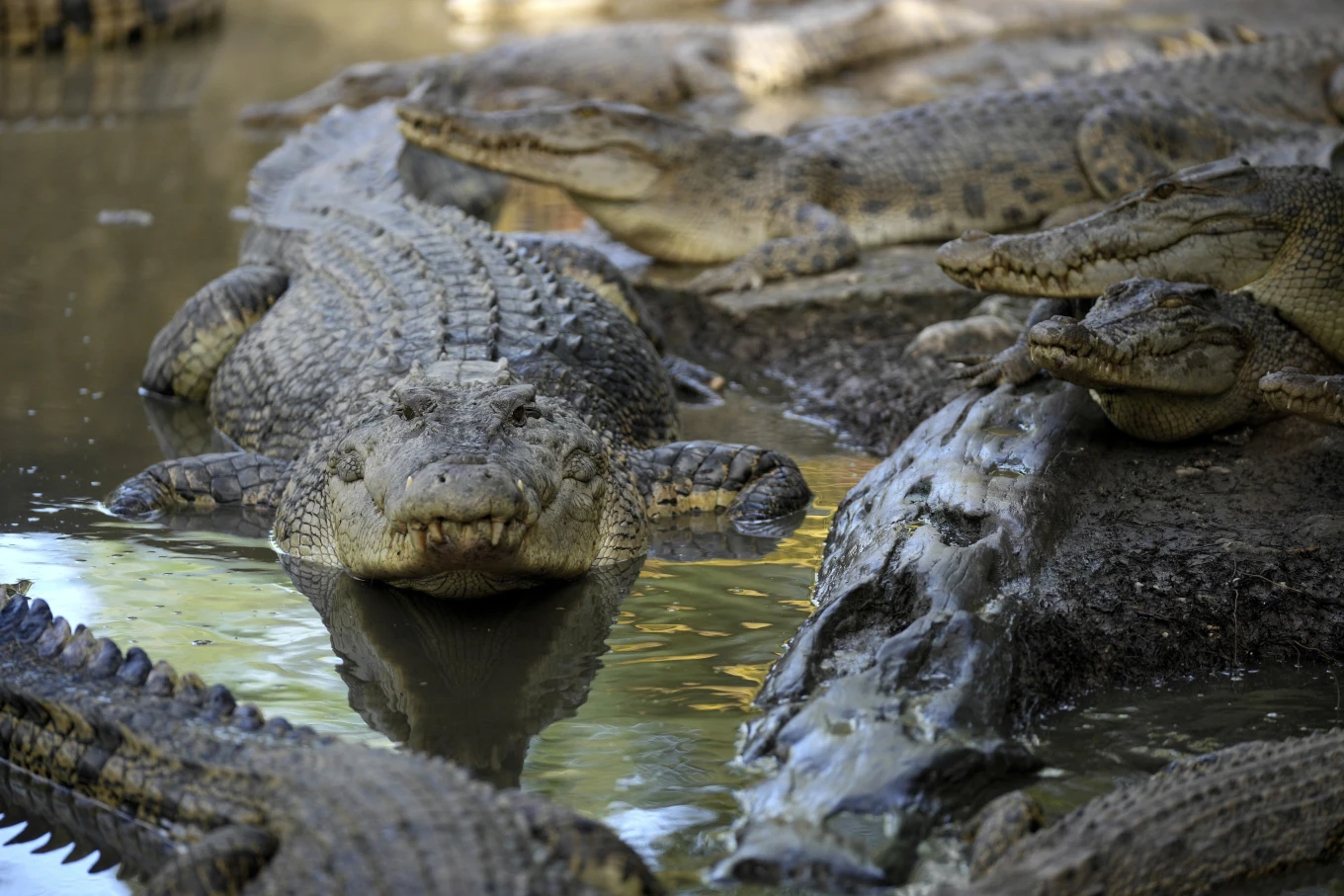
A crocodile nicknamed Karossa, after the name of a village it was captured from following the fatal attack of a man, rests with others inside an enclosure in Budong-Budong, West Sulawesi Island, Indonesia, Monday, Feb. 24, 2025. (AP Photo/Dita Alangkara)
Amir Hamidy, who studies reptiles at the National Research and Innovation Agency, worries the rise in attacks indicates that crocodile numbers are becoming far too dangerous. Hamidy supports better population control.
Being a protected species “does not necessarily mean that the population cannot be reduced when it is at a level that is indeed unsafe,” he said.
Improving protection for residents
Around a year ago in Tumbu village, Suardi, who goes by one name, was harvesting coconuts when they fell into the river. When he went to retrieve them, he was attacked by a crocodile he initially didn’t notice. He’s since made a full recovery.
Still, the experience has made him more cautious. “Yes, I am worried. But what else can we do,” Suardi said. “The important thing is that we are careful enough.”
Along with Munirpa, Suardi is one of 10 people in the region who was attacked by a crocodile last year. Three of those attacked were killed.
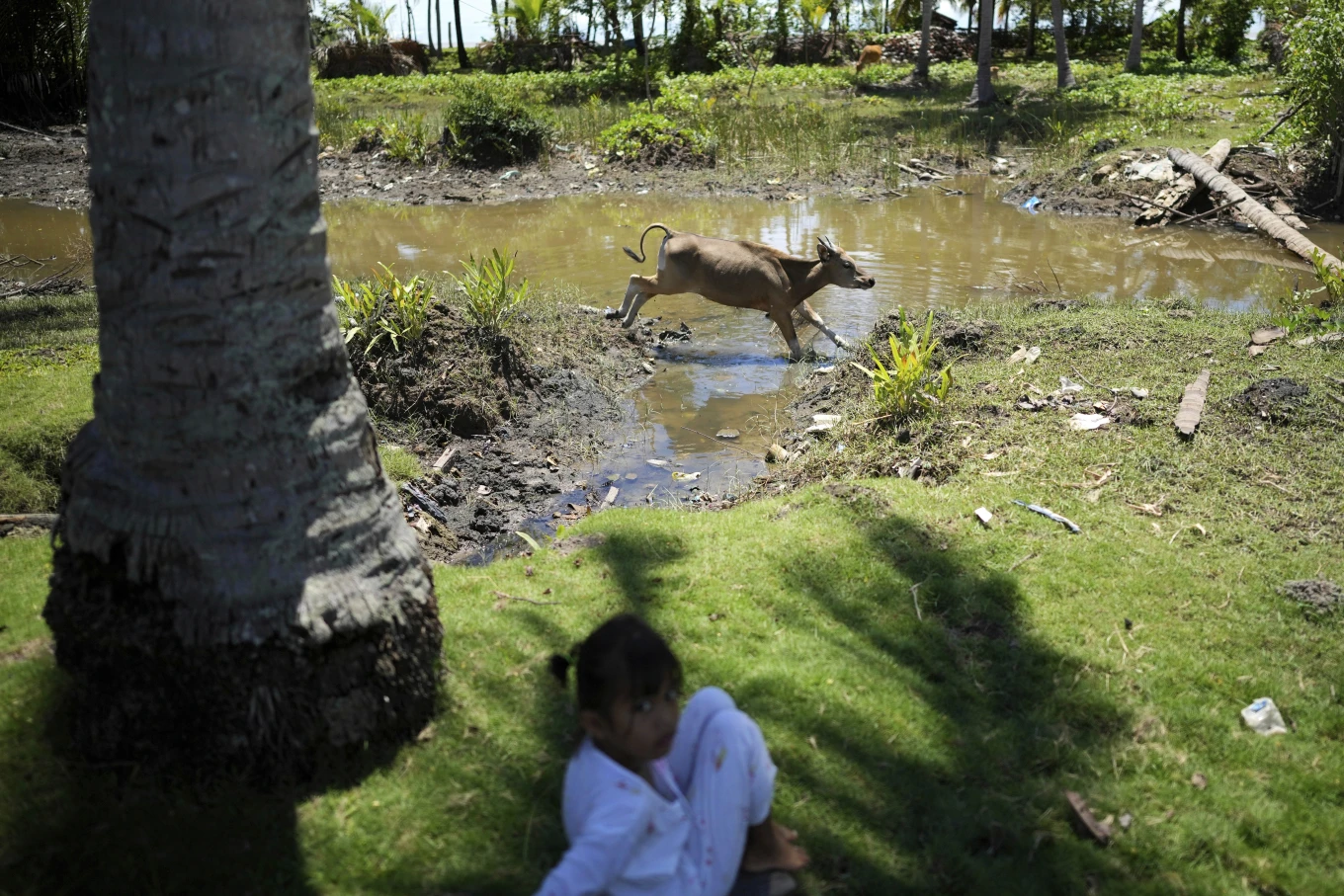
A cow jumps over the water near a stream where a crocodile attack occurred several months prior, in Topoyo, West Sulawesi, Indonesia, Monday, Feb. 24, 2025.
(AP Photo/Dita Alangkara)
Suyuti Marzuki, who’s head of West Sulawesi Marine and Fisheries Agency, said the crocodile habitat shift is making people’s everyday activities — like harvesting coconuts, fishing or even disposing of garbage like Munirpa — very risky.
Marzuki said the government is looking at possible options that can provide both safety and economic alternatives for residents.
While he acknowledged that crocodile population numbers and ecosystems need to be protected, Marzuki also raised the possibility of bolstering the local economy through the crocodile skin trade. That industry is controversial because of conservation and animal welfare issues.

Paraili, the crocodile handler, also urged serious government interventions.
“This is a matter of human lives. So when the government is not serious, then our brothers and sisters in the future — in 5 or 15 years — there will be even more who will die from being attacked by crocodiles,” he said.
Residents like Munirpa and Suardi are waiting for more immediate and realistic steps from the authorities to ensure their community’s and families’ safety.
“It is enough that I’ve been bitten by a crocodile,” Munirpa said. “I won’t let it happen to my children.”
Never smile at a crocodile
No, you can't get friendly with a crocodile
Don't be taken in by his welcome grin
He's imagining how well you'd fit within his skin
Never smile at a crocodile
Never tip your hat and stop to talk a while
Never run, walk away, say goodnight, not goodday
Clear the aisle but never smile at Mister Crocodile
You may very well be well bred
Lots of etiquette in your head
But there's always some special case, time or place
To forget etiquette
For example
One positively must not wear a pleased expression on his countenance
When confronted with that large lizard-like amphibious reptile
Who has long jaws, armored skin and webbed feet and who is known as the crocodile
It has been discovered that one simply cannot cherish an amicable
Or trustworthy relationship with the a for mentioned species
In addition, it is mandatory that one does not become irresistible drawn into
The erroneous belief that the lateral open extension of his lips means that you're entirely welcome
It is much more reasonable to assume that he is contemplating how you would look in a lizard suit
His, hehe
Clear the aisle but never smile at Mister Crocodile
https://apnews.com/article/indonesia-crocodile-attack-sulawesi-2fb54c806a1b0d1450a267ae4cccf730
They should barbeque them more, just like they do in Vietnam.
- Joined
- Dec 18, 2004
- Messages
- 43,535
- Reaction score
- 43,266
Rank all of them!I was just curious about your experience. Most of them were nice enough to me but I couldn't tell how much of it was genuine and how much of it was them just trying to get my business.
They're not my favorite group of people I have to admit but not the worst either.
- Joined
- Nov 28, 2021
- Messages
- 2,095
- Reaction score
- 3,725
I'd get banned lol.Rank all of them!
- Joined
- Dec 18, 2004
- Messages
- 43,535
- Reaction score
- 43,266
It is just preference. Like I didn't like Vietnam and Laos much. Rank the places you been to. Do a ranking like this video.I'd get banned lol.
- Joined
- Nov 28, 2021
- Messages
- 2,095
- Reaction score
- 3,725
It is just preference. Like I didn't like Vietnam and Laos much. Rank the places you been to. Do a ranking like this video.
I can do that haha. I thought you meant ranking groups of people.
The locals are a big part of a country of course but for me the nature, food, infrastructure, price, visa policies, and what kind of tourism it attracts are all part of it.
It's hard for me to make an judgement on Indonesia because it's such a huge place with lots of difference islands. They're all kind of the same but different at the same time. I spent most of my time in Bali though which is it's own thing in so many ways. I've only been to 3 or 4 other islands in Indonesia though. The nature and wildlife is a big part of the reason I travel and Indonesia has that in spades. But overall the culture and food is mid-tier.
It ranks high among the countries I've been globally, but low within Southeast Asia.
- Joined
- Nov 2, 2017
- Messages
- 18,678
- Reaction score
- 16,182
Which way did the crocodile vote?? That's the real question........
- Joined
- Aug 27, 2015
- Messages
- 7,787
- Reaction score
- 13,702
The men from the village need to band together and cull the numbers themselves. Bait the crocs and put them down.
No clue what you’d need to put down a croc. Would a 12 gauge slug do the job? I have a 375 H&H magnum that certainly should but it’s like $6 Canadian every time I pull the trigger so maybe not a viable option.
They could feed the village with the meat.
No clue what you’d need to put down a croc. Would a 12 gauge slug do the job? I have a 375 H&H magnum that certainly should but it’s like $6 Canadian every time I pull the trigger so maybe not a viable option.
They could feed the village with the meat.
- Joined
- Sep 17, 2005
- Messages
- 21,381
- Reaction score
- 22,871
The men from the village need to band together and cull the numbers themselves. Bait the crocs and put them down.
No clue what you’d need to put down a croc. Would a 12 gauge slug do the job? I have a 375 H&H magnum that certainly should but it’s like $6 Canadian every time I pull the trigger so maybe not a viable option.
They could feed the village with the meat.
Or just stay clear of the rivers where the crocs are and stop throwing heaps of their garage into their homes.
- Joined
- Aug 27, 2015
- Messages
- 7,787
- Reaction score
- 13,702
I don’t think it’s as simple as to build waste infrastructure a dna whole new village in a poor third world country though.Or just stay clear of the rivers where the crocs are and stop throwing heaps of their garage into their homes.
Plus now the crocs realize humans can be prey. Some of them have even began mimicking human behavior to hunt them like pretending to drown.
- Joined
- May 15, 2016
- Messages
- 8,126
- Reaction score
- 8,599
"she threw her household garbage into a creek about 50 meters (164 feet) away from her house, as she normally would."


- Joined
- Aug 17, 2013
- Messages
- 4,769
- Reaction score
- 2,928
What do you want her to do? Send it to the moon(?)."she threw her household garbage into a creek about 50 meters (164 feet) away from her house, as she normally would."
WTF?? If you throw your garbage into my home every day I'm gonna bite you too.
- Joined
- Dec 18, 2004
- Messages
- 43,535
- Reaction score
- 43,266
Name the least favorite 5 countries in Asia? What countries weren’t nice?I can do that haha. I thought you meant ranking groups of people.
The locals are a big part of a country of course but for me the nature, food, infrastructure, price, visa policies, and what kind of tourism it attracts are all part of it.
It's hard for me to make an judgement on Indonesia because it's such a huge place with lots of difference islands. They're all kind of the same but different at the same time. I spent most of my time in Bali though which is it's own thing in so many ways. I've only been to 3 or 4 other islands in Indonesia though. The nature and wildlife is a big part of the reason I travel and Indonesia has that in spades. But overall the culture and food is mid-tier.
It ranks high among the countries I've been globally, but low within Southeast Asia.
Last edited:
- Joined
- Nov 28, 2021
- Messages
- 2,095
- Reaction score
- 3,725
Personally I'd rank the following from the worst to best among the countries I like least.Name the least favorite 5 countries in Asia? What countries weren’t nice?
Korea
Hong Kong (If you count it as a country)
Malaysia
Japan
The Philippines
Cambodia
Taiwan
But there are a lot of caveats. There are things I really liked about the above countries but this is in general. And it really depends on what you're looking for. I know some people love Korea but I just find it boring and the people are not that likable as a whole. Malaysia has insane nature and amazing food but I don't care for how Muslim it is and traveling there felt a bit more restricted. The Philippines didn't feel as safe, the food sucks, and traveling isn't as easy because they're all islands, but the nature made up for it.
My ranking would also change depending on whether I'm just traveling through to sightsee or staying and living longer. For example one of my favorite countries for traveling is Laos but I can't see myself staying there for longer than a couple months. Thailand is the GOAT for both fyi.
If you want to be technical I'd add the UAE and Oman as the worst since they're technically in Asia, but I'm guessing you meant East Asia.
- Joined
- Apr 21, 2007
- Messages
- 20,683
- Reaction score
- 11,295
Maybe stop throwing your fucking trash in their home…
I’m on the side of the crocodile here.

Litterbugs should get rekt.
- Joined
- Aug 19, 2024
- Messages
- 600
- Reaction score
- 718
This is a punishment from God. He sent the crocodiles to punish the evil-doers, and when is angry, all the population suffers from it's wrath.
May this be a message to those who are defying God, and may our prayers soften his wrath upon us, another calamity like this could strike in our area as well.
May this be a message to those who are defying God, and may our prayers soften his wrath upon us, another calamity like this could strike in our area as well.
Similar threads
Nature & Animals
The last-ditch race to save the Orinoco crocodile
- Replies
- 8
- Views
- 277
